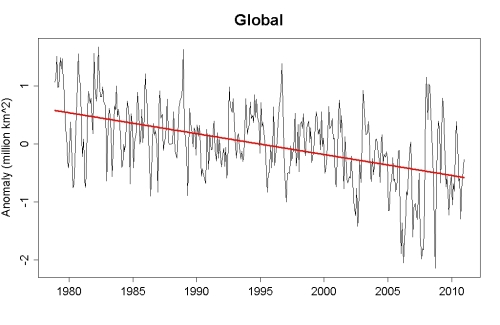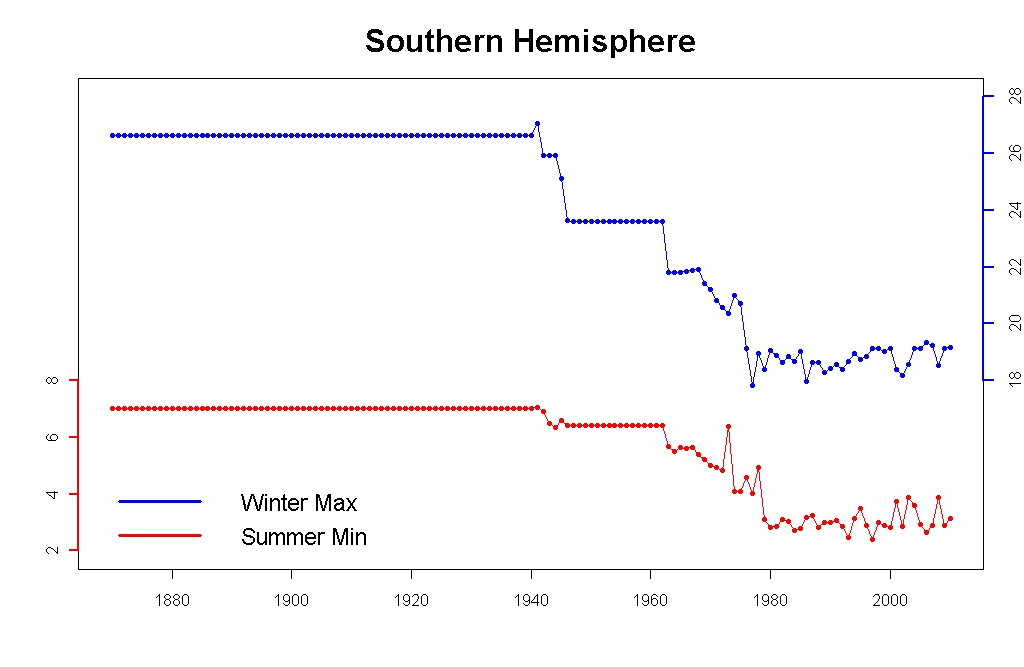- Joined
- Jul 19, 2012
- Messages
- 14,185
- Reaction score
- 8,768
- Location
- Houston
- Gender
- Male
- Political Leaning
- Libertarian
Advocates of anthropogenic global warming (AGW) like to point to the loss of ice in the Arctic as evidence of global warming. Skeptics like to point the Antarctic, which is gaining ice, as evidence against global warming.
Setting all of that aside for a moment, why should it be that there is a difference between the two?
Some possible explanations:
The Antarctic ice sheet is an open sea, pretty much impacted by the same factors year after year.
On the other hand, the Arctic is almost a closed ocean, where all of the following can have an effect on the amount of mid-summer ice.
1. River flows (there are no rivers in the Antarctic) – there are several huge rivers feeding the Arctic ocean, such as the Yenisey, Ob, Lena, Mackenzie and Yukon So the salinity of the Arctic ocean is constantly changing seasonally, annually and locally.
2. The complex layers of salinity in the Arctic Ocean can be dramatically affected by currents, winds and large storms – when more saline water is brought closer to surface it is more difficult to freeze. Also, it should be remembered were it not for the fact the near surface salinity of the Arctic Ocean is significantly less than other oceans (fresh water is less dense than sea water), the Arctic Ocean would have much less ice.
3. Soot – most of man’s industrial and fuel burning activities take place in the Northern Hemisphere, so not surprisingly the amount of heat absorbing soot present on the surface of the Arctic ice is many times that on the Antarctic ice.
4. Arctic ice floats around in free ice floes and may migrate into warmer waters depending on the winds. Antarctic ice is almost all attached to solid sheets that are less affected by wind.
The factors affecting the extent of the Arctic ice cap are far more complex than those in the Antarctic, but in neither case does the extent of ice under typical conditions of weather make for an especially good index of temperature.
Setting all of that aside for a moment, why should it be that there is a difference between the two?
Some possible explanations:
The Antarctic ice sheet is an open sea, pretty much impacted by the same factors year after year.
On the other hand, the Arctic is almost a closed ocean, where all of the following can have an effect on the amount of mid-summer ice.
1. River flows (there are no rivers in the Antarctic) – there are several huge rivers feeding the Arctic ocean, such as the Yenisey, Ob, Lena, Mackenzie and Yukon So the salinity of the Arctic ocean is constantly changing seasonally, annually and locally.
2. The complex layers of salinity in the Arctic Ocean can be dramatically affected by currents, winds and large storms – when more saline water is brought closer to surface it is more difficult to freeze. Also, it should be remembered were it not for the fact the near surface salinity of the Arctic Ocean is significantly less than other oceans (fresh water is less dense than sea water), the Arctic Ocean would have much less ice.
3. Soot – most of man’s industrial and fuel burning activities take place in the Northern Hemisphere, so not surprisingly the amount of heat absorbing soot present on the surface of the Arctic ice is many times that on the Antarctic ice.
4. Arctic ice floats around in free ice floes and may migrate into warmer waters depending on the winds. Antarctic ice is almost all attached to solid sheets that are less affected by wind.
The factors affecting the extent of the Arctic ice cap are far more complex than those in the Antarctic, but in neither case does the extent of ice under typical conditions of weather make for an especially good index of temperature.



